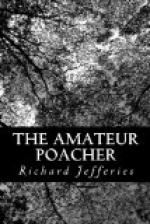The man’s instinct for hunting was so strong that it seemed to overcome everything else. He would walk miles—after a long day’s farm work—just to help old Luke, the rabbit contractor, bring home the rabbits in the evening from the Upper Woods. He worked regularly for one farmer, and did his work well: he was a sober man too as men go, that is he did not get drunk more than once a month. A strong man must drink now and then: but he was not a sot, and took nine-tenths of his money faithfully home to his wife and children.
In the winter when farm work is not so pressing he was allowed a week off now and then, which he spent in ferreting for the farmers, and sometimes for Luke, and of course he was only too glad to get such an engagement as we gave him. Sometimes he made a good thing of his ferreting: sometimes when the weather was bad it was a failure. But although a few shillings were of consequence to him, it really did not seem to be the money-value but the sport that he loved. To him that sport was all-absorbing.
His ferrets were well looked after, and he sometimes sold one for a good price to keepers. As a rule a man who keeps ferrets is suspected: but Little John was too well understood, and he had no difficulty in begging a little milk for them.
His tenacity in pursuit of a rabbit was always a source of wonder to me. In rain, in wind, in frost; his feet up to the ankle in the ice-cold slush at the bottom of a ditch: no matter what the weather or how rough, he patiently stood to his nets. I have known him stand the whole day long in a snowstorm—the snow on the ground and in the holes, the flakes drifting against his face—and never once show impatience. All he disliked was wind—not on account of discomfort, but because the creaking of the branches and the howling of the blast made such a noise that it was impossible to tell where the rabbit would bolt.
He congratulated himself that evening because he had recovered all his ferrets. Sometimes one will lie in and defy all efforts to bring it out. One plan is to place a dead fresh rabbit at the mouth of the hole which may tempt the ferret to come and seize it. In large woods there are generally one or more ferrets wandering loose in the season, that have escaped from the keepers or poachers.
If the keeper sees one he tries to catch it; failing that, he puts a charge of shot into it. Some keepers think nothing of shooting their own ferrets if they will not come when called by the chirrup with the lips, or displease them in other ways. They do not care, because they can have as many as they like. Little John made pets of his: they obeyed him very well as a rule.
Poaching men are sometimes charged with stealing ferrets, i.e. with picking up and carrying off those that keepers have lost. A ferret is, however, a difficult thing to identify and swear to.




